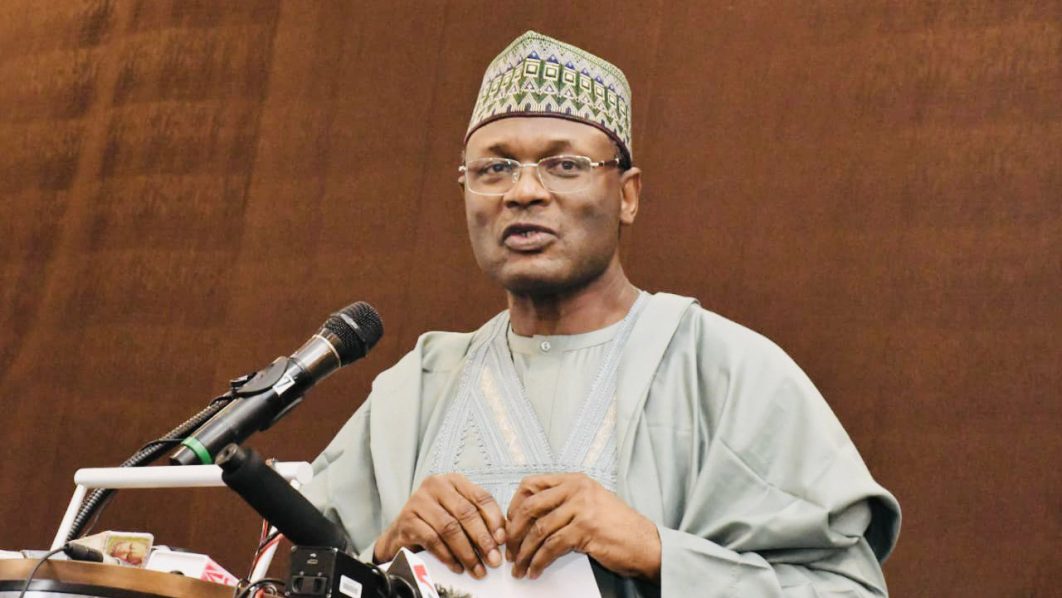
Photo/twitter/inecnigeria
• Commission to conduct mock accreditation nationwide
• ‘Electoral body prepared for possible presidential run-off’
• Affirms allegiance to Nigerians not parties or candidates
Chairman of Independent National Electoral Commission, Prof. Mahmood Yakubu, yesterday, declared to international audience that the Commission is ready to conduct next month’s general elections.
Yakubu gave the affirmation at the Royal Institute of International Affairs (Chatham House) London, while speaking on ‘Nigeria’s 2023 Elections: Preparations and Priorities for Electoral Integrity and Inclusion.’
The presidential and National Assembly elections will hold on February 25 while governorship and State Assembly polls come up on March 11.
“We are leaving no stone unturned in our preparations. Our commitment remains only to Nigerians and not to any political party or candidate. That is what the law requires of us. We cherish the institutional independence and integrity of the Commission,” Yakubu said.
The INEC chairman also disclosed that the Commission would conduct mock accreditation nationwide ahead of the elections. He said the mock exercise would be carried out across selected polling units to ascertain the integrity of the Bimodal Voter Accreditation System (BVAS) before the main polls in February.
He, however, revealed that every BVAS machine deployed across the 774 local councils has been tested, stressing that the functionality of the machines is impressive. He added that back up machines have also been provided in case of glitches.
According to Yakubu, “we have the machines for the 2023 elections but we didn’t want to take chances. Each and every machine has been tested and confirmed functional. For the last two weeks, our officials were in the 36 states of the federation testing these machines, and the functionality is simply encouraging.
“The second thing we’re going to do, and pretty soon, is to conduct mock accreditation exercise nationwide, ahead of the elections. We won’t wait until the main elections come. We will test the integrity of these machines with real life voters in selected polling units across the country.
“We did so in Ekiti and Osun. It was fantastic and we’re going to do so nationwide. Increasingly, our people are becoming more excited about the deployment of this technology and we’re really happy.
“Also, in terms of the numbers of these BVAS machines, we always make provision in case of malfunction or glitches. There is always a back up. We have IReV technical support that will fix the machines in the unlikely event of any glitches.
“However, where it fails to function completely in a polling unit, from previous experience, there were isolated polling units, the law has a remedy that the Commission should re-mobilise and re-conduct elections in the affected polling units within 24 hours, so we are really, really comfortable where we are.”
SPEAKING on the possibility of a presidential run-off, Yakubu said INEC is up to the task, in case no winner emerges at the first ballot. He noted that INEC had always prepared for the possibility of a presidential run-off in the last three elections, and this year’s poll won’t be an exception.
He also affirmed that the Commission is not considering postponement of the presidential poll, despite attacks on its offices nationwide.
“The truth of the matter is that for every general election, the Commission prepares, at least, for some time now, in the last three electoral cycles, we also prepare for that possibility,” he told participants at the forum.
“The reason is: until the Constitution was amended, there was only one week for presidential run-off, in case it happens. With the number of registered voters we have, it is almost impossible to print the ballot papers required and the result sheet and deliver them to locations and conduct the elections as required.
“So, every election, since the last three electoral cycles, we also make provision for the possibility of a presidential run-off, in case it happens. If it happens, then we’ll have no issues, and this year is no exception,” Yakubu said. He said with the amendment to the Constitution, INEC now has three weeks between the presidential election date and the run-off date.
“Fortunately, the time frame has also been extended. The first alteration to the Constitution has extended it by two more weeks.
“So, it is now three weeks, instead of one week, which we had before. We always prepare for that possibility, in case it happens. We don’t know; it is in the hands of the voters. But if it happens, we will not be caught napping.”
Responding to a question on diaspora voting, the INEC boss said there are legal issues preventing Nigerians abroad from voting. He, however, said the electoral body has concluded a policy on diaspora voting.
He expressed hope that the legal obstacles preventing foreign-based Nigerians from voting will be cleared eventually. In his words: “We have actually completed the policy as far as the Commission is concerned and we identified two categories of Nigerians living outside the country.
“We have the OCV (out-of-country) voting, mainly by service personnel and other Nigerians engaged in, say, foreign service, and those who are engaged in technical manpower.
“There is assistance organised by the Nigerian government for other countries, particularly in our sub-region. For now, they don’t vote. But the other leg of it is for Nigerians permanently resident outside Nigeria, that is, the diaspora voting.”
The INEC boss explained that the Commission worked with Nigerians in diaspora organisations within the United Kingdom and in the United States.
“We’re even happy that some Constitutional amendments were submitted to the National Assembly. But eventually, they didn’t sail through, in terms of the propositions forwarded to the state Assemblies for concurrence,” he said.
According to Yakubu, the Commission only acts in accordance with the electoral legal framework, which remains the main reason why it cannot implement diaspora voting at present, much as its leadership would like to.
“Both the 1999 Constitution and the 2022 Electoral Act provide that voters can only be registered and vote within the country,” he said.



